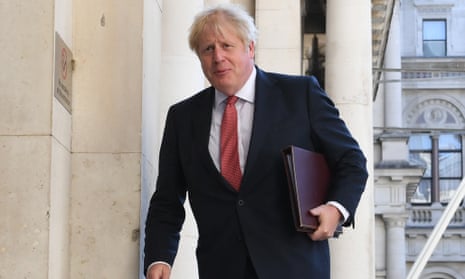The government is set to implement strict rules on how junk food is advertised and sold in the UK, with restrictions such as a ban on online adverts and TV commercials before the 9pm television watershed.
Sources say that the plans, which have been spearheaded by Boris Johnson following his coronavirus health scare, are yet to be finalised but could be announced as soon as Sunday or early next week.
The measures to tackle the growing obesity epidemic are expected to be far-reaching, going beyond curbs on media and advertising to include restrictions on in-store promotions.
Johnson had previously criticised the sugar tax, labelling it a “sin stealth tax”, but is understood to have changed his mind after he was hospitalised with Covid-19 in April. The prime minister is said to blame his own weight issues for contributing to his illness and obesity has been identified as a key factor in whether people are seriously affected by coronavirus.
TV broadcasters have previously said that a pre-watershed ban advertising products high in fat, salt and sugar, commonly referred to as junk food, would cost them more than £200m in revenues annually.
“Brands have partnered effectively with government over the lockdown period to support, develop and amplify public health campaigns as well as safeguard and support employees,” said Phil Smith, the director general of ISBA, which represents the vast majority of major advertisers in the UK. “Just as business begins to chart a course back from the severe impacts of Covid-19, such an ill-thought-out policy cuts across Treasury efforts to support the sector and risks jobs and livelihoods.”
Media companies and the food industry have faced the prospect of complete ad bans by the government several times over more than a decade, but in each instance the plans have been abandoned. However, this time executives fear such measures will be introduced, with Johnson saying last month that “we will be happier, fitter and more resistant to diseases like Covid if we can tackle obesity”.
The UK has the highest death rate from coronavirus in Europe, with high rates of obesity and associated lifestyle-related conditions, such as type 2 diabetes and high blood pressure, linked to worse Covid-19 outcomes.
Previous reviews of UK regulations have resulted in a significant tightening of restrictions over the years. In 2007, advertisers were banned from running junk food ads in kids’ programmes or shows with average audiences of more than 20% children. More recently, new online marketing rules stop advertisers from targeting children.
Advertisers say that the such far-reaching rules will go far beyond catching just major brands to dramatically affect thousands of small companies as well.
“Speculation that the government intends to introduce bans on high fat, salt and sugar advertising would be in direct conflict with its own evidence that such restrictions would have a minimal impact on obesity levels,” said Stephen Woodford, the chief executive of the Advertising Association. “These measures, if introduced, would have significant economic impact at a time when the economy is already under strain. The government must reconsider any proposals which could damage the recovery.”
